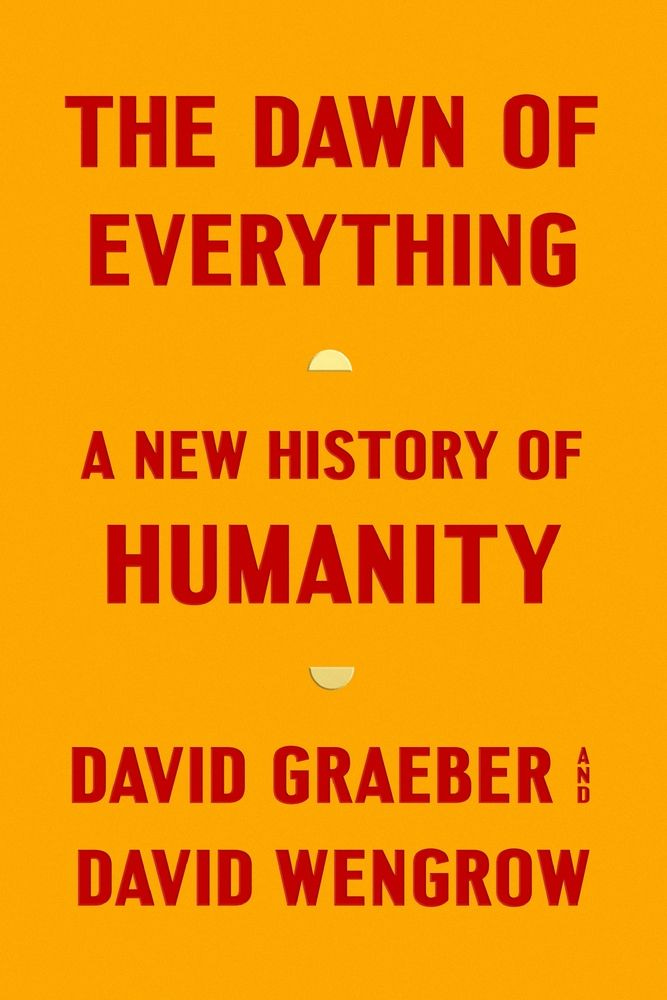The Dawn of Everything by David Graeber
David's last book raises a lot of important questions about the structure of society and how we reached here.
Imagine you happen upon a site of a bomb blast. You see the body of a person ripped to bits. Is this person the victim or the suicide bomber? Anthropologists have to deal with questions like this every day. They are not looking at a blast site but the remains from thousands; sometimes tens of thousands of years ago.
But not much unlike the blast site, their determination is often coloured by their worldview and that means often we need to question what we know of history. A lot of “pre-history” was written by men who were often (cough *always*) white who lived in lands ruled by kings and in societies where inequities were great.
Much like his book Debt where David Graeber asks the question - Does debt always have to be paid back? Don’t you price in the possibility of default in the interest? Then why do sovereign debts never get written off? And then goes on to shred our understanding of money and debt completely; In the book Dawn of Everything, he starts with the simple question - Is inequality inevitable as civilisations develop?
He takes this assumption apart by posing many more questions and providing many other possibilities that patriarchy has forbidden anthropologists from setting their sights on.
The book highlights that Europe was a land that had been under kings forever. For thousands of years since the Greeks and the Romans, the land always had a ruler. Inequality was normal for them. As the new world was discovered, they crossed the Atlantic and found a society that was all about equality. He suggests the European enlightenment came from the Americas to Europe. As the European missionaries went to America and found a way of life where they did not have to be ruled but could set their laws all by themselves. Those ideas came back to Europe in a trickle and then caused revolutions.
This assertion itself is hard for Europeans to swallow because they see themselves as superior.
Tribes in Africa tended to have a two-tiered system where a leader would lead the tribe in the winters; while there were no leaders in the summer months at a time of plenty. These tribes and the people were therefore political but did not allow an inequitable system to entrench itself because they were fully aware of its pitfalls. He argues that much like modern people, political thought and savvy existed in man from long ago. It was a cultural choice to not allow that to entrench itself in society. In that, every society made its choices.
He cites the examples of American tribes of the northwest pacific and those who lived in what is California today. The North-western tribes had a leader and king while the southern tribes shunned this even though they were aware of the practices further North. Humans defined their own cultures and often it was a conscious ‘NO’ that they said to many of the practices. He described this as Schismogenesis where people chose what culture they wished to follow and therefore created schisms in their way of life as opposed to another tribe.
Often graves that are cited as proof of the existence of kings in pre-history were not for kings at all. In other words, the pre-historic kings were often dead kings. They were people who probably had exceptional abilities, strange proclivities or autistic or other such things, which caused them to be celebrated in death rather than be placed on a pedestal as kings when alive.
Men were involved in hunting but women used to be engaged in pottery, basket weaving, etc in early history. This implies that she had to be adept at geometry. Women knew geometry many millennia ago but no text ever credits them for this. The patriarchal anthropologist finds it hard to swallow and accept that women were the scientists of the pre-historic world. They were the ones spending time, innovating and creating.
Agriculture evolved over 3000 years. Unless people were avoiding the development of agriculture this is far too long. In all likelihood, women were botanists experimenting with plants in their small gardens. They were engaged in what can be described as ‘play farming’. They developed agriculture but it did not become mainstream for a long time because communities avoided being enslaved by plants. They knew farming and they knew what was possible but did not wish to be beholden to the cycles of farming.
Did agriculture lead to cities or did cities lead to agriculture? Have you seen any village? An agricultural agglomeration is spread out wide because each person needs lands around their home to farm. Cities cannot form in such a layout. Agriculture could only be an afterthought to cities. It is more likely that we have got this the wrong way around.
Then he talks about the three things that form the basis of power in a society.
Sovereignty - Control of information,
Domination - Threat of violence and
Charisma - Having an influence over people
The extent of each has varied over time. But even today different nations use different combinations of the same to control the people within and outside of their nations.
Inequality is a cultural choice that society has made and accepted. For now, this inconvenient imbalance is being preserved by the world order.



have we figured out the yardsticks, measures or benchmarks of equality before we worry about inequalities. Is it the money or food or land that needs to be equally distributed or available to each of us?